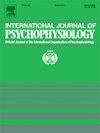Adverse childhood experiences do not relate to cardiovascular or baroreflex reactivity to acute mental stress in the laboratory
IF 2.6
3区 心理学
Q3 NEUROSCIENCES
引用次数: 0
Abstract
Adverse childhood experiences (ACEs) are highly prevalent and associated with a wide range of adverse behavioral, psychiatric, and physical health outcomes in adulthood. Given the robust link between ACEs and poor health, identifying underlying physiological mechanisms is crucial. One proposed mechanism is cardiovascular stress reactivity, the increase in heart rate (HR) and blood pressure (BP) in response to mental stress. The present study examined the relationship between ACEs and cardiovascular reactivity and additionally investigated baroreflex function as a potential upstream regulator of the stress response. Participants (N = 130, M = 20.43 years, 65 % female, 62 % white) completed the Childhood Trauma Questionnaire (CTQ) and a socially evaluative mental arithmetic stressor in the laboratory. HR, BP, and baroreflex function was measured during both baseline and stress conditions. Baroreflex function was assessed using the sequence method. Stress reactivity was defined as the change in HR, BP, or baroreflex function from baseline to stress. HR and BP significantly increased and baroreflex function significantly decreased in response to mental stress (all p < 0.001). However, after controlling for sex, cohort, baseline values, and perceived stress, no significant associations emerged between CTQ scores, total or subscales, and either cardiovascular or baroreflex reactivity (all p ≥ 0.55). In contrast to other studies that report ACEs are related to exaggerated or blunted HR and BP, these findings suggest that ACEs are not related to cardiovascular reactivity. ACEs were not related to baroreflex stress reactivity either but since this is the first study to examine this relationship, more research is needed.
在实验室中,不良的童年经历与心血管或气压反射性对急性精神压力的反应无关
童年不良经历(ace)非常普遍,并与成年后的各种不良行为、精神和身体健康结果相关。鉴于ace与健康状况不佳之间的紧密联系,确定潜在的生理机制至关重要。一种被提出的机制是心血管应激反应,即在精神压力下心率(HR)和血压(BP)的增加。本研究考察了ace与心血管反应性之间的关系,并进一步研究了应激反应的应激反射功能。参与者(N = 130, M = 20.43岁,女性占65%,白人占62%)在实验室完成了儿童创伤问卷(CTQ)和社会评价心算压力源。在基线和应激条件下测量HR、BP和压力反射功能。用序列法评价压力反射函数。应激反应性定义为心率、血压或压力反射功能从基线到应激的变化。精神应激组HR和BP显著升高,压力反射功能显著降低(p < 0.001)。然而,在控制了性别、队列、基线值和感知压力后,CTQ评分、总量表或亚量表与心血管或气压反射反应性之间没有显着关联(均p≥0.55)。与其他报道ace与HR和BP的夸大或钝化有关的研究相反,这些研究结果表明ace与心血管反应性无关。ace也与压力反射性应激反应无关,但由于这是第一次研究这种关系,因此需要更多的研究。
本文章由计算机程序翻译,如有差异,请以英文原文为准。
求助全文
约1分钟内获得全文
求助全文
来源期刊
CiteScore
5.40
自引率
10.00%
发文量
177
审稿时长
3-8 weeks
期刊介绍:
The International Journal of Psychophysiology is the official journal of the International Organization of Psychophysiology, and provides a respected forum for the publication of high quality original contributions on all aspects of psychophysiology. The journal is interdisciplinary and aims to integrate the neurosciences and behavioral sciences. Empirical, theoretical, and review articles are encouraged in the following areas:
• Cerebral psychophysiology: including functional brain mapping and neuroimaging with Event-Related Potentials (ERPs), Positron Emission Tomography (PET), Functional Magnetic Resonance Imaging (fMRI) and Electroencephalographic studies.
• Autonomic functions: including bilateral electrodermal activity, pupillometry and blood volume changes.
• Cardiovascular Psychophysiology:including studies of blood pressure, cardiac functioning and respiration.
• Somatic psychophysiology: including muscle activity, eye movements and eye blinks.

 求助内容:
求助内容: 应助结果提醒方式:
应助结果提醒方式:


